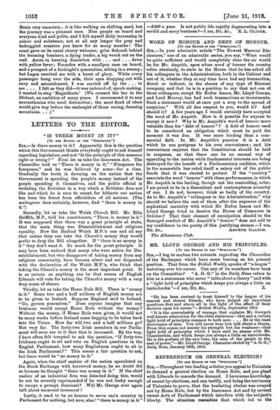WORD OF HONOUR AND DEBT OF HONOUR.
[TO TEE EDITOR OF THE "EPROTATOR.'l
SIR, In your admirable article "The Newest Marconi Dis- closures," one of an admirable series, you say, " What would be quite sufficient and would completely clear the air would be for Mr. Asquith, upon whose word of honour the country relies absolutely, to state in the House that he has asked all his colleagues in the Administration, both in the Cabinet and out of it, whether they at any time have had any transaction, direct or indirect, in the shares of any type of Marconi company, and that he is in a position to say that not one of those colleagues, except Sir Rufus Isaacs, Mr. Lloyd George, and Lord Murray, has had such transactions or investments. Such a statement would at once put a stop to the spread of suspicion." With all due respect to you, would it ? And should it? A few years ago I would certainly have accepted the word of Mr. Asquith. How is it possible for anyone to accept it now ? Why is Mr. Asquith's word of honour more valuable than his " debt of honour" ? A debt of honour used to be considered an obligation which must be paid the moment it was due. It was more binding than a com- mercial debt. In Mr. Asquith's practice it is a debt which he can postpone to his own convenience ; and his convenience requires that the Constitution should be held in suspense, so that there can be no normal way of appealing to the nation while fundamental interests are being destroyed for the benefit of a Parliamentary coalition, which in the meanwhile has voted itself a salary out of the public funds that it was elected to protect. If the " country " associate the word "honour" with these performances, in which Mr. Asquith is the leading, though not the controlling, actor, I am proud to be in a dissentient and contemptuous minority of one. I do not, however, think so badly of the country. As to Mr. Asquith's " colleagues in the Administration," why should we believe the rest of them after the exposure of the sophistical casuistry with which Sir Rufus Isaacs and Mr. Lloyd George tried to deceive the House of Commons in October P That their channel of exculpation should be the damaged conduit of Mr. Asquith's " honour " does not add to my confidence in the purity of this justifying stream.—I am,










































 Previous page
Previous page